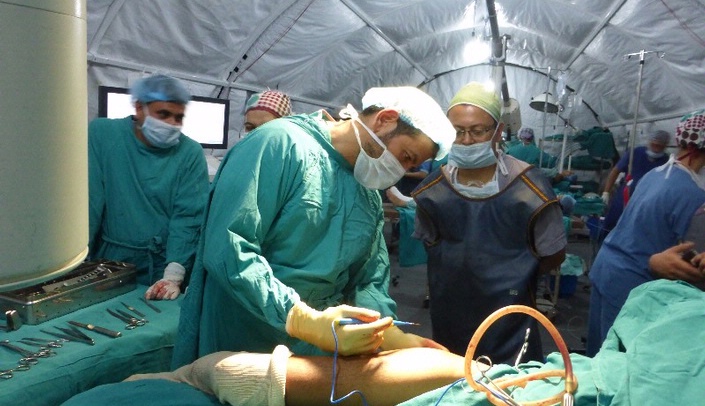The Nepal Relief Effort Committee for the University of Nebraska Medical Center and Nebraska Medicine has determined that building schools and purchasing medical equipment would be the best use of the more than $24,000 raised to assist victims of Nepal’s devastating April 25 earthquake..
“You can build a school for about $4,000,” said Ward Chambers, M.D., coordinator of the committee. “We originally thought building housing would be the best way to go, but we were informed that unless we could rebuild all the homes in an entire village that building a school would be a better use of funds.
“Obviously, since education is a big part of what we do at UNMC/Nebraska Medicine, this seems like a perfect way to use the money. Plus, it will be a tremendous way to help villages begin the process of returning to some degree of normalcy.”
Dr. Chambers said donations can still be made to the UNMC Nepal Disaster Relief Fund through the University of Nebraska Foundation.
In recent days, a UNMC student group contributed $2,000 to the relief fund. In addition, after reading a previous story in the UNMC Today newsletter, officials at Valmont Industries, Inc., elected to donate $10,000 from the company’s foundation to the UNMC Nepal Disaster Relief Fund.
“We can’t thank the UNMC student group and Valmont enough for their generous donations,” Dr. Chambers said. “The additional funds will allow us to build at least five new schools in Nepal. That’s pretty impressive.”
Dr. Chambers said any additional money raised or left over in the relief fund would go toward medical equipment for the Nepal Orthopaedic Hospital in Kathmandu.
A UNMC orthopaedic surgeon, Miguel Daccarett, M.D., worked at the Nepal Orthopaedic Hospital during the last week of May.
Dr. Daccarett is now back at work, but he gained some valuable first-hand experience with how difficult things are in Nepal following the earthquakes.
During his time in Nepal, Dr. Daccarett performed 2-3 surgeries each day. By the time he left, he said all of the hospital’s pending orthopaedic caseload had been completed.
“It was quite an experience,” he said. “After morning rounds, we’d start doing surgeries each day at 9 a.m. They had us operating in an OR tent. It was really warm – about 90 degrees. I would start sweating right away and would have to take periodic breaks to drink water and get hydrated.
“Some of the cases were quite difficult. You had bones that were broken 2-3 weeks before and were now partially healed. With some of these patients, I would have to re-break the bone to make sure it would heal in the right position. The surgical equipment was not what we have in the U.S., so I was forced to improvise a little bit.”
Dr. Daccarett said the earthquakes have scarred the people of Nepal.
“Each day, there would be 3-4 aftershocks from the earlier earthquakes. The people really panic when these aftershocks occur.”
We are Nebraska Medicine and UNMC. Our mission is to lead the world in transforming lives to create a healthy future for all individuals and communities through premier educational programs, innovative research and extraordinary patient care.
Twitter | Facebook | Pinterest | YouTube
